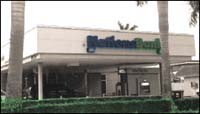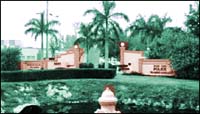|
The Crime and Its Aftermath
As the January issue of the Doral Tribune rolled off
the presses on the morning of the 14th last month several well-armed
men rolled into the NationsBank branch at 9701 NW 41 St.

The huge Metro-Dade Police Headquarters and Metro-Dade Police Doral
Station complex at NW 25 St and NW 94 Ave.
Shouting, waving handguns, and flinging smoke bombs,
the men made nearly as much of a commotion as our presses at full
tilt.

The NationsBank at NW 41 St and NW 97 Ave--located directly between
the two Metro-Dade Police facilities.
Terry Nelson, media representative for the Miami
branch of the FBI painted a frightening picture of that morning:
"This was a violent event; this wasn't someone slipping a note to
the teller saying "give me all your money." One guy came in
and secured the lobby for the other, who vaulted the counter to
collect the money. They both carried handguns, were wearing black
cargo pants and black t-shirts, they had tied white bandannas around
their faces, and each had a military beret cap on his head."

The sprawling Metro-Dade Police Training Bureau, north of NW 58 St at
NW 96 Ave.
Vanessa Cook, a detective in the Media Relations
Bureau and the Public Information Officer (PIO) assigned to the scene
of the bank robbery, was thankful the customers and employees came
away unscathed.
Cook said, "As far as I know everyone was very
cooperative and were very thankful to have made it out safely. No one
was injured--thank was the most important thing."
But the potential for serious harm was certainly
there--and in the aftermath of this event Doral residents were forced
to once again evaluate their unincorporated status. But it wasn't a
lack of parks or roads or churches that inspired introspection this
time.
Suddenly the issue of whether or not to incorporate
seemed a much graver issue; it wasn't just a matter of quality of
life, but rather a matter of life or death.
But to immediately assume this crime could have been
prevented or the suspects could have been apprehended had there been a
dedicated "City of Doral" police force is an
oversimplification.
METRO-DADE POLICE
PERFORMANCE "PROFESSIONAL"
The fact of the matter is, the Metro-Dade Police Department did a
bang-up job handling this case from the second they received the call
that went out regarding the robbery.
Metro-Dade's reaction time was more than just swift,
it was nearly instantaneous.
Cook explained, "Almost immediately after the
BOLO (be on the lookout for...) was issued, either one or two Doral
area patrol officers spotted the suspects' car. It was almost
instantly, not even a matter of minutes after they got the call. They
immediately secured the bank and followed the suspect's car."
The officers gave competent chase as well--they didn't
lose the car until it exited the Turnpike abruptly and dangerously to
head west on NW 27 St, almost 20 miles away.
And when they located the car, which had only very
recently been abandoned, again more likely a matter of moments rather
than minutes said Cook, the Metro-Dade Police were able to bring their
real advantages to bear: the size of their force and the
sophistication of their equipment.
"We have approximately 3,000 sworn officers in
the Miami-Dade area," explained Cook. "The suspects bailed
out of the car but we were able to set up a huge perimeter in
northwest Miami-Dade assisted by the Miramar Police. By that time the
FBI was in charge of the investigation, so we were basically providing
the manpower to support a perimeter at that point, but we were able to
provide our helicopter to lend assistance as well."
Metro-Dade did everything they were supposed to, and
exceptionally well. That the suspects got away can be attributed to
their own dumb luck more than anything else, and by the time that
happened the case was already out of Metro-Dade's hands and in the
FBI's anyway.
"I myself have worked bank robberies with Metro
for 15 years now," Nelson said, "and they've always handled
themselves professionally and with great competence. This case was no
different."
A DORAL FORCE AS A DETERRENT?
In this case at least it seems that a "City of Doral" Police
Department can't be justified given Metro-Dade's performance; they
were total professionals throughout. But despite their performance,
the central question remains: would a specific "City of
Doral" force have deterred the robbers?
Firstly, I'm not sure you could have picked a worse
place than that NationsBank branch, with the Metro-Dade Police
Headquarters just over 20 blocks south as well as the attached Doral
Station, and the Metro-Dade Training Bureau--another huge facility--a
little more than 20 blocks north.
To pick a target like that seems to most likely
indicate one of three things: a total ignorance of one's surroundings,
an overriding arrogance and/or overwhelming self-confidence, or a
total lack of respect for the local law enforcement.
But that's not all--the suspects took the time to rob
the drive-through tellers as well as the inside clerks only seems to
reinforce those assumptions.
Both Cook and Nelson were surprised by the daring of
the robbery. Cook herself called the burglary, "very
brazen", while Nelson thought that ignorance of their
surroundings was the only thing that could've prompted them to act. He
was particularly surprised that they chose to rob both the tellers and
clerks.
"That's certainly unusual," he said,
"usually it's one or the other."
Would 'Doral Police' have deterred robbery?
When I asked Nelson whether he thought that the crime
might have been prevented by the presence of a municipal police force
and not just Metro-Dade he disagreed wholeheartedly.
"No," he said, "it wouldn't have
effected it at all--we have bank robberies in small communities all
the time--(a city force is) not the key, not in situations like this.
I'm a big supporter of the Metro-Dade department; it's a mistake to
think that just because they're large, they don't have a deterrent
effect. They do."
He said that in cases like this, major crimes,
Metro-Dade's reputation provides just as much of a deterrent as a city
force would.
As it turns out Nelson happens to live in a recently
incorporated municipality; when I discovered that I asked whether or
not he had noticed a drop in crime in conjunction with incorporation.
"I did," he said, "I'm sure the rates
for less serious crime dropped. For smaller, petty types of crime a
local police department can definitely be a deterrent. But I just
don't think for more serious crimes that's always the case."
PINECREST: AN EXAMPLE OF THE MUNICIPAL FORCE AS A
DETERRENT
The daylight robbery of the Washington Mutual Bank in Pinecrest a
little over a month ago would seem to reinforce Nelson's theory that
major crime isn't necessarily deterred by a municipal force. It too
was a sensational crime and it was splashed across the papers and
dissected by the local TV stations just like the NationsBank robbery.
But when you delve past the anecdotal evidence and
examine statistics, you will find a much different story--that crime
across the board has dropped since Pinecrest's incorporation.
If you can, I would encourage you to go online to
www.thetribune.net and check the web site of our sister publication,
the Pinecrest Tribune.. In her article on page three of the January
31-February 13 issue, Editor Veronica Pontes-Matzner points out that
since incorporation Pinecrest has, "consistently seen a decline
in the various crime categories, with the exception of petty
crime."
And even that increase is misleading because it
results from the public's restored confidence in their police
department--people are now reporting things they never would have
reported to Metro-Dade.
As Pontes-Matzner explained, "How many of us
would bother reporting a child's bike stolen from our front yard or a
vandalized mail
|